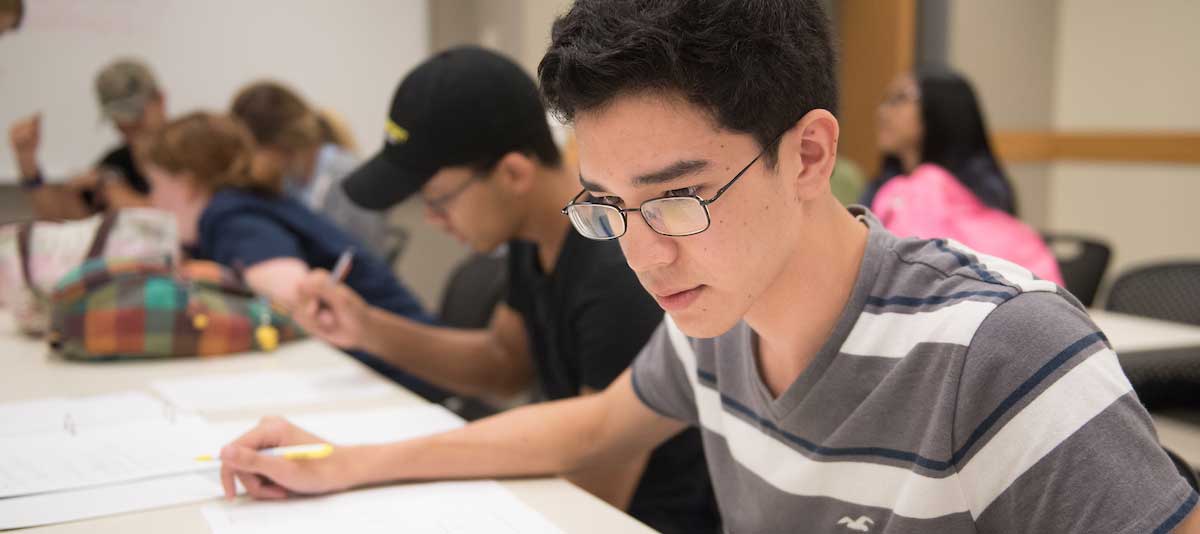Dual Enrollment
Applications for Summer and Fall 2026 are available now! The class schedule will be available in late March.

What is Dual Enrollment?
Simply put, dual enrollment lets local high school senior and junior students enroll in college classes to meet their high school graduation requirements and start earning college credit.
UTC’s dual enrollment options include enrolling in courses on their high school's campus, online or on UTC’s campus.
Have you completed your sophomore year of high school and have a 3.0 GPA? You’re eligible for dual enrollment.
Get ahead. Be prepared.
Knock out a few college classes before you graduate from high school. You’ll get a jump-start on your college career and be that much closer to your college degree.
By taking a few college courses while you’re still in high school, you get a taste of what your future holds. Our faculty don’t know you’re a high school student—you’ll be working alongside college students, completing the same assignments and meeting the same requirements.
The transition from high school to college will be that much easier.
And if you don’t plan on attending college at UTC, most of the credits you earn here will transfer.
Course Offerings for Spring 2026
- ART1110: Introduction to Art
This course exposes students to art and different themes of art-making across time and space. It teaches students to identify, describe, contextualize, and analyze artworks from a wide range of media, as well as apply these observations to their lives outside of the classroom. By bridging the gap between art of the past and our contemporary visual world, this course expands students’ understanding of visual history, how images come to produce meaning, and how the nature of visual experience is constructed. The course is organized thematically and showcases significant artworks from cultures across the globe ranging from the prehistoric-era to the contemporary moment. Focus is divided between learning historical trends, critical concepts, and interpreting artworks. These materials are considered in isolation as well as within the socio-cultural contexts that produced them.
Online, No Set Meeting Times, Structured Expectations
- BIOL1050: Life on Earth & BIOL1050L: Life on Earth Laboratory
An introduction to systematic ways in which the human mind comprehends the natural world; emphasis on scientific reasoning, the diversity of life, evolutionary relationships, interactions between living systems, chemical transformation pathways, the natural and anthropogenic influences on Earth’s climate, and how changes in climate affect living systems. The laboratory integrates the scientific approach and provides hands-on experience in developing and testing explanations for natural patterns observed in living systems.
Online, No Set Meeting Times, Structured Expectations
- BIOL1100: Conservation of Biodiversity
An introduction to systematic ways in which the human mind comprehends the natural world; emphasis on studies of living systems, natural processes, and related phenomena including evolution, population biology, ecosystem properties, biomes, extinction, human overpopulation, deforestation, global climate change, preservation of species, conservation ethics and economics, public policy, and sustainability.
Online, No Set Meeting Times, Structured Expectations
- CRMJ1100: Introduction to the Criminal Justice System
An overview of the criminal justice system as it currently operates in its three major components: police, courts, corrections. A broad-based interdisciplinary perspective is employed to introduce students to the criminal processing system in the United States.
Online, No Set Meeting Times, Structured Expectations
- HIST2030: History of Tennessee
This course will familiarize students with the historical development of Tennessee from the earliest beginnings of the state to the present. We will examine social, political, economic, and intellectual change to better understand the emergence of contemporary Tennessee.
Online, No Set Meeting Times, Structured Expectations
- MATH2100: Introductory Statistics
Introductory course suitable for students in a variety of disciplines. Emphasizes basic concepts, including descriptive statistics, elementary probability, estimation, and hypothesis testing. This course teaches students how to interpret, to develop, and to use statistical and probabilistic models of real-world phenomena. Students will learn how to solve practical problems using statistical vocabulary, notation, and appropriate technology.
Online, No Set Meeting Times, Structured Expectations
- PSPS1010: American Politics
The foundations, institutions, processes and policies of American national government with attention to the Constitution and such topics as elections, political and civil rights and liberties, federalism, public policy, public opinion, political culture, interest groups, and the role of citizens in governance.
Online, No Set Meeting Times, Structured Expectations
- REL1100: Introduction to Western Religions
An introduction to the major religious traditions emerging in Western cultures, with emphasis on Judaism, Christianity, and Islam.
Online, No Set Meeting Times, Structured Expectations